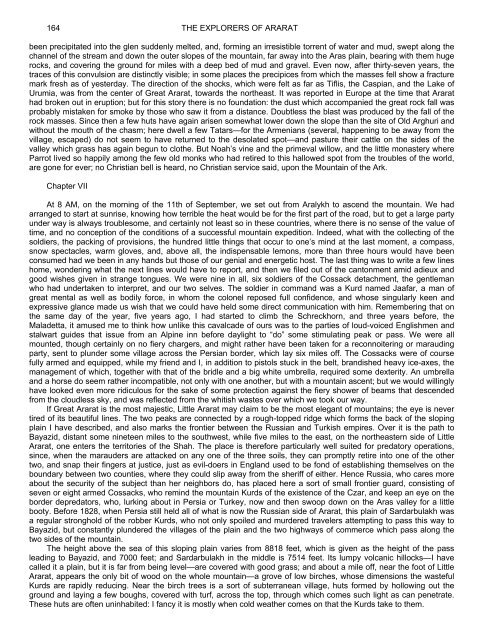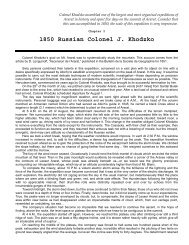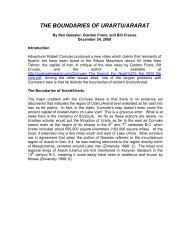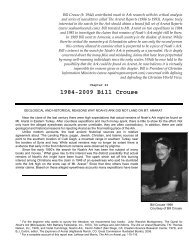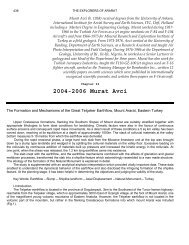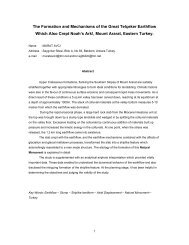1876 British Viscount & Ambassador James Bryce - Noah's Ark Search
1876 British Viscount & Ambassador James Bryce - Noah's Ark Search
1876 British Viscount & Ambassador James Bryce - Noah's Ark Search
You also want an ePaper? Increase the reach of your titles
YUMPU automatically turns print PDFs into web optimized ePapers that Google loves.
164 THE EXPLORERS OF ARARAT<br />
been precipitated into the glen suddenly melted, and, forming an irresistible torrent of water and mud, swept along the<br />
channel of the stream and down the outer slopes of the mountain, far away into the Aras plain, bearing with them huge<br />
rocks, and covering the ground for miles with a deep bed of mud and gravel. Even now, after thirty-seven years, the<br />
traces of this convulsion are distinctly visible; in some places the precipices from which the masses fell show a fracture<br />
mark fresh as of yesterday. The direction of the shocks, which were felt as far as Tiflis, the Caspian, and the Lake of<br />
Urumia, was from the center of Great Ararat, towards the northeast. It was reported in Europe at the time that Ararat<br />
had broken out in eruption; but for this story there is no foundation: the dust which accompanied the great rock fall was<br />
probably mistaken for smoke by those who saw it from a distance. Doubtless the blast was produced by the fall of the<br />
rock masses. Since then a few huts have again arisen somewhat lower down the slope than the site of Old Arghuri and<br />
without the mouth of the chasm; here dwell a few Tatars—for the Armenians (several, happening to be away from the<br />
village, escaped) do not seem to have returned to the desolated spot—and pasture their cattle on the sides of the<br />
valley which grass has again begun to clothe. But Noah’s vine and the primeval willow, and the little monastery where<br />
Parrot lived so happily among the few old monks who had retired to this hallowed spot from the troubles of the world,<br />
are gone for ever; no Christian bell is heard, no Christian service said, upon the Mountain of the <strong>Ark</strong>.<br />
Chapter VII<br />
At 8 AM, on the morning of the 11th of September, we set out from Aralykh to ascend the mountain. We had<br />
arranged to start at sunrise, knowing how terrible the heat would be for the first part of the road, but to get a large party<br />
under way is always troublesome, and certainly not least so in these countries, where there is no sense of the value of<br />
time, and no conception of the conditions of a successful mountain expedition. Indeed, what with the collecting of the<br />
soldiers, the packing of provisions, the hundred little things that occur to one’s mind at the last moment, a compass,<br />
snow spectacles, warm gloves, and, above all, the indispensable lemons, more than three hours would have been<br />
consumed had we been in any hands but those of our genial and energetic host. The last thing was to write a few lines<br />
home, wondering what the next lines would have to report, and then we filed out of the cantonment amid adieux and<br />
good wishes given in strange tongues. We were nine in all, six soldiers of the Cossack detachment, the gentleman<br />
who had undertaken to interpret, and our two selves. The soldier in command was a Kurd named Jaafar, a man of<br />
great mental as well as bodily force, in whom the colonel reposed full confidence, and whose singularly keen and<br />
expressive glance made us wish that we could have held some direct communication with him. Remembering that on<br />
the same day of the year, five years ago, I had started to climb the Schreckhorn, and three years before, the<br />
Maladetta, it amused me to think how unlike this cavalcade of ours was to the parties of loud-voiced Englishmen and<br />
stalwart guides that issue from an Alpine inn before daylight to “do” some stimulating peak or pass. We were all<br />
mounted, though certainly on no fiery chargers, and might rather have been taken for a reconnoitering or marauding<br />
party, sent to plunder some village across the Persian border, which lay six miles off. The Cossacks were of course<br />
fully armed and equipped, while my friend and I, in addition to pistols stuck in the belt, brandished heavy ice-axes, the<br />
management of which, together with that of the bridle and a big white umbrella, required some dexterity. An umbrella<br />
and a horse do seem rather incompatible, not only with one another, but with a mountain ascent; but we would willingly<br />
have looked even more ridiculous for the sake of some protection against the fiery shower of beams that descended<br />
from the cloudless sky, and was reflected from the whitish wastes over which we took our way.<br />
If Great Ararat is the most majestic, Little Ararat may claim to be the most elegant of mountains; the eye is never<br />
tired of its beautiful lines. The two peaks are connected by a rough-topped ridge which forms the back of the sloping<br />
plain I have described, and also marks the frontier between the Russian and Turkish empires. Over it is the path to<br />
Bayazid, distant some nineteen miles to the southwest, while five miles to the east, on the northeastern side of Little<br />
Ararat, one enters the territories of the Shah. The place is therefore particularly well suited for predatory operations,<br />
since, when the marauders are attacked on any one of the three soils, they can promptly retire into one of the other<br />
two, and snap their fingers at justice, just as evil-doers in England used to be fond of establishing themselves on the<br />
boundary between two counties, where they could slip away from the sheriff of either. Hence Russia, who cares more<br />
about the security of the subject than her neighbors do, has placed here a sort of small frontier guard, consisting of<br />
seven or eight armed Cossacks, who remind the mountain Kurds of the existence of the Czar, and keep an eye on the<br />
border depredators, who, lurking about in Persia or Turkey, now and then swoop down on the Aras valley for a little<br />
booty. Before 1828, when Persia still held all of what is now the Russian side of Ararat, this plain of Sardarbulakh was<br />
a regular stronghold of the robber Kurds, who not only spoiled and murdered travelers attempting to pass this way to<br />
Bayazid, but constantly plundered the villages of the plain and the two highways of commerce which pass along the<br />
two sides of the mountain.<br />
The height above the sea of this sloping plain varies from 8818 feet, which is given as the height of the pass<br />
leading to Bayazid, and 7000 feet; and Sardarbulakh in the middle is 7514 feet. Its lumpy volcanic hillocks—I have<br />
called it a plain, but it is far from being level—are covered with good grass; and about a mile off, near the foot of Little<br />
Ararat, appears the only bit of wood on the whole mountain—a grove of low birches, whose dimensions the wasteful<br />
Kurds are rapidly reducing. Near the birch trees is a sort of subterranean village, huts formed by hollowing out the<br />
ground and laying a few boughs, covered with turf, across the top, through which comes such light as can penetrate.<br />
These huts are often uninhabited: I fancy it is mostly when cold weather comes on that the Kurds take to them.


